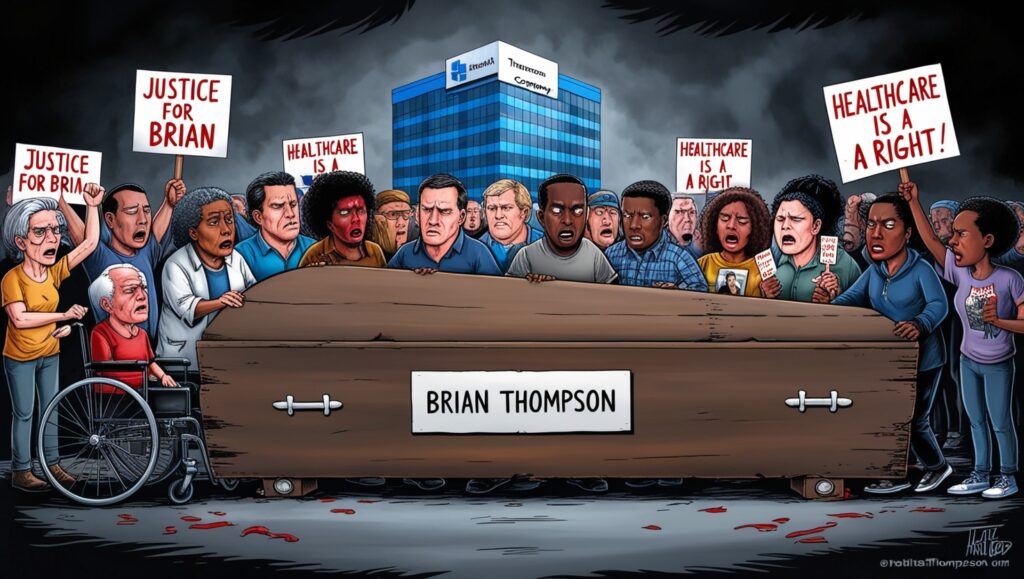
The death of United Healthcare’s CEO, Brian Thompson, has ignited a fierce public backlash against health insurance companies, shedding light on long-standing frustrations with the industry’s practices. While the loss of any corporate leader might usually go unnoticed in public discourse, Thompson’s death has become a catalyst for conversations surrounding the systemic issues facing the health insurance sector, particularly in the United States.
Thompson, who led one of the largest health insurance providers in the nation, had been under increasing scrutiny due to United Healthcare’s pricing strategies, claims denials, and overall approach to consumer health. His passing has intensified criticism from all corners, with many seeing it as the final straw in an ongoing struggle between healthcare providers and the insured public.
Rising Anger Over Healthcare Inequities
For years, health insurance companies have faced growing discontent from consumers who feel burdened by skyrocketing premiums, high deductibles, and limited access to necessary treatments. The industry has been accused of prioritizing profits over people, with numerous reports highlighting how insurers often deny claims, delay services, or provide inadequate coverage. As healthcare costs continue to rise, these practices have fueled resentment among individuals, particularly those with pre-existing conditions, who feel trapped in an expensive system that fails to meet their needs.
The death of Brian Thompson has turned the spotlight on the wider healthcare system and its failure to provide affordable and accessible care. While some argue that the insurance companies have played a significant role in increasing healthcare accessibility, the broader public believes that these companies have profited from people’s misfortune by raising rates and limiting care options. The backlash following Thompson’s death has reflected a deep sense of frustration, as millions of Americans face healthcare challenges with few solutions in sight.
A Wake-Up Call for Reform
Thompson’s death has raised an important question: How far are health insurance companies willing to go in addressing public dissatisfaction? The incident has prompted many to call for greater regulation and more transparency in how insurance providers operate. Advocates for healthcare reform argue that the system must be overhauled to ensure that every person, regardless of their income or health status, has access to the care they need without facing exorbitant costs.
Some industry leaders have responded with sympathy for the public outcry but also pointed out that they are working toward solutions that balance profitability with accessibility. However, many remain skeptical of the insurance industry’s commitment to real change. The aftermath of Thompson’s death has served as a potent reminder that public trust in health insurance companies is at an all-time low, and only bold reforms can restore that trust.
Moving Toward a Better Healthcare System
The public backlash against health insurance companies following Brian Thompson’s death is not just an emotional response; it’s a call for meaningful change. People are increasingly looking for alternative models to the current system, such as universal healthcare, or solutions that prioritize patient care over corporate profit. The key will be ensuring that any reforms put the interests of individuals first, rather than the bottom line of insurance providers.
Ultimately, the death of a corporate leader like Brian Thompson has become a rallying point for a much-needed conversation about the future of healthcare in the U.S. and around the world. It underscores the deep mistrust that has built up over years of rising costs, limited access to care, and questionable business practices in the insurance industry. The only question now is whether those in power will heed the public’s call for change.
Conclusion
As the dust settles on the public outcry following Brian Thompson’s passing, the pressure on health insurance companies to reform is stronger than ever. For consumers, it represents an opportunity to push for a system that is fairer, more accessible, and more compassionate. In the end, the death of one man has highlighted the profound issues within a system that affects millions. Now, the question remains: Will the industry listen?


